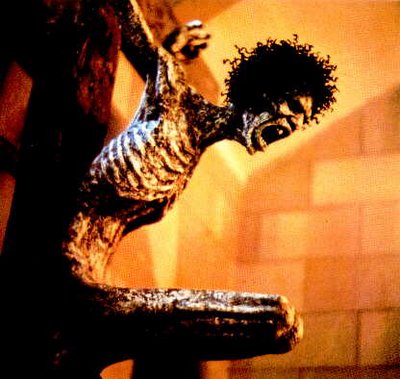
In Chacabuco, a concentration camp in the desert area of northern Chile, the following poem was written in 1974 by one of the political prisoners. Some Christian communities in Chile now use it as
prayer at the eucharist.
The armed retinue was mocking
the one crowned with thorns,
they took off his rags
and beat his head with a cane.
Offensive mouths spat on the man
with the long hair, rebel eyes and unkempt beard.
So, mocked by the soldiers
and with a mistreated body,
a bloodied man was dying
before the eyes of the high priests -
supreme hyprocrisy, supreme meaness and greed.
Today I remember you, a freedom-loving Christ,
vagabond in time, dubious in space.
Were you Spartacus' brother,
contemporary of the slave or comrade worker?
What matters the chain, the fiefdom, the wage:
to be Nazarene or Chacabuco inmate
if you are on earth, brother Christ,
Son, with dirty face and calloused hands,
flesh and blood of the people, lord of history
at home with the plane and hammer,
a distinguished carpenter;
or with shovel, pick and pointed stick,
a noble road builder...
Eternal resident of the poor and barren hovel
with roof of tin or stars, floor of sand or dirt,
modest or captive walls.
You do not dwell in the oppressive mansion,
the caves of thieves or the palace of Caesar.
The ingenuously pious fauthful swear they will find
you in the fixed and shallow rite,
in the golden chalice and the simplistic devotion
of those who cry 'Lord, Lord'
but who, after going through the motions, do nothing.
In preference to these I choose the good samaritan
who does not preach about heaven
but seeks paradise on earth,
not an eternal calvary – a hell of illiterate poor.
Yes, I prefer the witness
of the one who walks, suffers and loves,
of one who sings, weeps and loves,
of one who struggles, dies and loves.
I understand you, Christ,
because I know betrayal and the spear,
because, like you, I say
I am king and claim my crown.
I ask to be monarch of my own destiny
and father of all children,
I desire emancipation for myself and brothers.
I demand a sceptre for a poor and earthly kingdom,
but dignified and free,
built by the brotherhood of creative hands
in a community of equality and historic prophecy.
That sceptre is mine and I claim it today,
because what I stand for is greater
than the cross I carry,
because my cheeks are tired of the Pharisee's blows
and my arm is asking for the whip.
And when the whir of my whip is silent
and the temple empty of merchants,
then the thorns, the hate and vinegar,
the scoffing and the weeping will be changed into
a welcome to the repentant centurion,
into kindness, poetry, and work,
because the man who brought back to life
ia always incarnating himself in his children
and Christian hope has the face of a child.
Poem by a political prisoner in a Chilean concentration camp
 RSS Feed
RSS Feed
